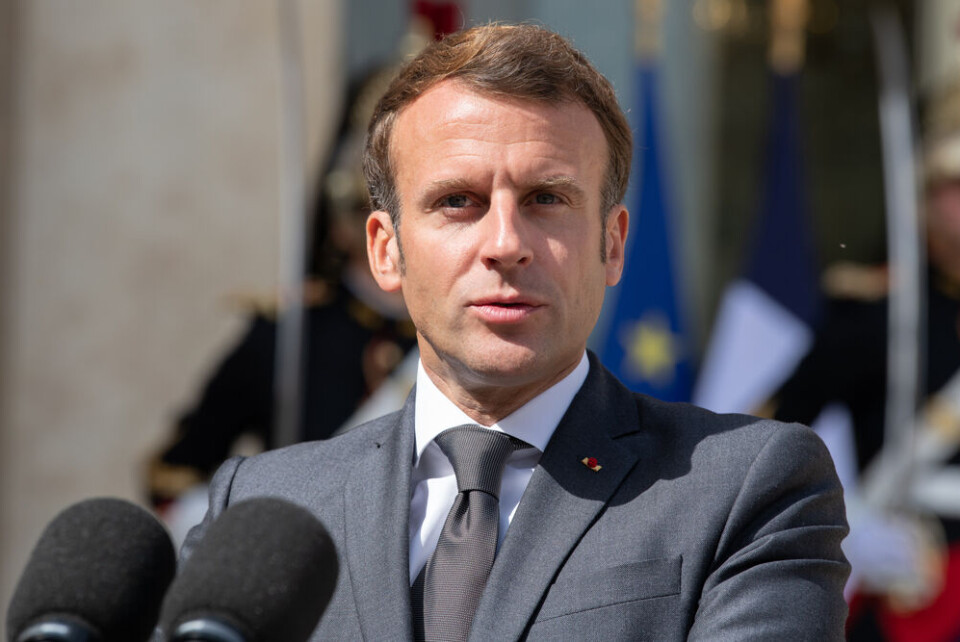-
Pistes closed, confinement orders: Alpine resorts deal with avalanche risk
Increased snowfall this weekend may cause further closures as busy school holiday season continues
-
Former French Interior Minister announces 2027 presidential candidacy
Bruno Retailleau recently asked prefectures to be tough on immigration
-
Ryanair axes Dublin-Rodez route but London connection retained
“We are disappointed but had no say in decision” say airport authorities
Macron raises possibility of referendum on immigration in France
But would such a plan first need constitutional change?

France could hold a referendum on immigration, President Macron has said, as he shared more details on his desire to expand the country’s rules on referendums.
However, a referendum on such a topic could require a change to the constitution depending on the nature of the question (or questions).
In a six-page official letter from the Elysée palace, Mr Macron shared his proposals with leaders of the political parties represented in parliament, and suggested that the group meets this autumn to debate whether to enlarge the country’s possible uses of referendums.
The president said that “a consensus had not emerged” from a 12-hour meeting with all sides on immigration on August 30.
He called his proposals a “major political initiative” saying his aim was to “overcome divisions” and pave the way for more referendums to avoid deadlock situations such as is happening now due to the absence of an absolute majority in the Assemblée Nationale.
The president said the topic of immigration features many “known disagreements” but that these issues “cannot be sidestepped” or ignored.
MPs are set to debate an immigration bill this autumn. The issue could then be put to a referendum, Mr Macron said. Issues likely to be up for debate include looking at France's capacity to take in new immigrants across its different regions.
It comes two weeks after President Macron said that France must significantly reduce immigration, especially at non-EU borders into the EU.
Read more: France must significantly reduce immigration, says Macron
(P)referendum
Other issues that could be discussed - and possibly put to referendums - include questions on devolving power away from Paris and proportional representation reform.
However, the constitution will likely need to be amended first to enlarge the rules on referendums.
In addition, it only allows for a single question to be given to the public for a referendum, and the answer must be ‘yes’ or ‘no’ only.
The French government’s official spokesperson, Olivier Véran, recently used the word ‘preferendum’ during a TV interview.
It is thought that it may be a portmanteau of either the words ‘referendum’ and ‘prefer’ or ‘plural’, and refer to a referendum with more than one question or questions with multiple possible answers. However, both concepts are unheard of in French politics and currently legally impossible.
Professor Dominique Rousseau, a professor of constitutional law at the Panthéon-Sorbonne university, told The Connexion: “It is far-fetched but it could [theoretically] be used for anything from immigration, to retirement age or women’s rights.”
Read more: 'Preferendum': a buzz word, not a real concept, says French law expert
Constitutional loophole on immigration
Article 11 of the constitution defines a referendum as a popular vote on ‘the organisation of public powers, on reforms related to economic, social or environmental policies and public services’.
There is no explicit provision for immigration in this definition. However, it has been debated since 2021 after Marine Le Pen, former president of far-right Rassemblement National, suggested a referendum on immigration during the last presidential election.
Such a referendum may be acceptable with the current constitution only if it does not pertain to asylum rights or family reunions, Xavier Bioy, a constitutional professor at Toulouse Capitole University, told France Info.
Furthermore, any change would have to respect the constitution, which rules out discrimination based solely on nationality. The constitution would have to be amended for any law proposal outside of these boundaries.
Devolution and ecological planning
The president has asked Prime Minister Elisabeth Borne to submit decisions within a month on the issue of devolution, including ways to strengthen “the effectiveness of the mayor-prefect pairing” (the ways in which mayors of small towns and prefects of local areas work together).
Mr Macron also confirmed that a ‘social conference’ on low wages, income trends, and the minimum wage will be held in October. He is also set to present a bill to departmental heads on the issues of intergenerational connections, and independence in old age, he said.
He also said that he and Ms Borne were working on a “roadmap for ecological planning”, which would be presented to MPs next week. Despite this, leader of the Green party, Marine Tondelier, criticised the president for giving "very little space" to ecology.
Similarly, workers’ unions the CGT, Force Ouvrière and CFE-CGC, have said that they are “boycotting” the contents of the letter to party heads. Writing such a letter has been described as a ‘Macronian tool’, which is intended to “build consensus” among disparate groups.
Read also
'Preferendum': a buzz word, not a real concept, says French law expert
President Macron faces battle over immigration crackdown in France
























